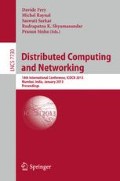Abstract
In [2], Lamport has defined three classes of shared registers which support read and write operations, called —safe, regular and atomic—depending on their properties when several reads and/or writes are executed concurrently. We consider generalizations of Lamport’s notions, called k-safe, k-regular and k-atomic. First, we provide constructions for implementing 1-atomic registers (the strongest type) in terms of k-safe registers (the weakest type). Then, we demonstrate how the constructions enable to easily and efficiently solve classical synchronization problems, such as mutual exclusion and ℓ-exclusion, using single-writer multi-reader k-safe bits, for any k ≥ 1. We also explain how, by using k-registers, it is possible to provide some level of resiliency against memory reordering.
Access this chapter
Tax calculation will be finalised at checkout
Purchases are for personal use only
Preview
Unable to display preview. Download preview PDF.
References
Herlihy, M., Shavit, N.: The Art of Multiprocessor Programming, 508 pages. Morgan Kaufmann Publishers (2008)
Lamport, L.: On interprocess communication, parts I and II. Distributed Computing 1(2), 77–101 (1986)
Mckenney, P.E.: Memory barriers: a hardware view for software hackers (2009)
Taubenfeld, G.: Synchronization Algorithms and Concurrent Programming, 423 pages. Pearson/Prentice-Hall (2006) ISBN 0-131-97259-6
Taubenfeld, G.: Weak read/write registers (2012), The full version is avaliable at http://www.faculty.idc.ac.il/gadi/Publications.htm
Author information
Authors and Affiliations
Editor information
Editors and Affiliations
Rights and permissions
Copyright information
© 2013 Springer-Verlag Berlin Heidelberg
About this paper
Cite this paper
Taubenfeld, G. (2013). Weak Read/Write Registers. In: Frey, D., Raynal, M., Sarkar, S., Shyamasundar, R.K., Sinha, P. (eds) Distributed Computing and Networking. ICDCN 2013. Lecture Notes in Computer Science, vol 7730. Springer, Berlin, Heidelberg. https://doi.org/10.1007/978-3-642-35668-1_29
Download citation
DOI: https://doi.org/10.1007/978-3-642-35668-1_29
Publisher Name: Springer, Berlin, Heidelberg
Print ISBN: 978-3-642-35667-4
Online ISBN: 978-3-642-35668-1
eBook Packages: Computer ScienceComputer Science (R0)

